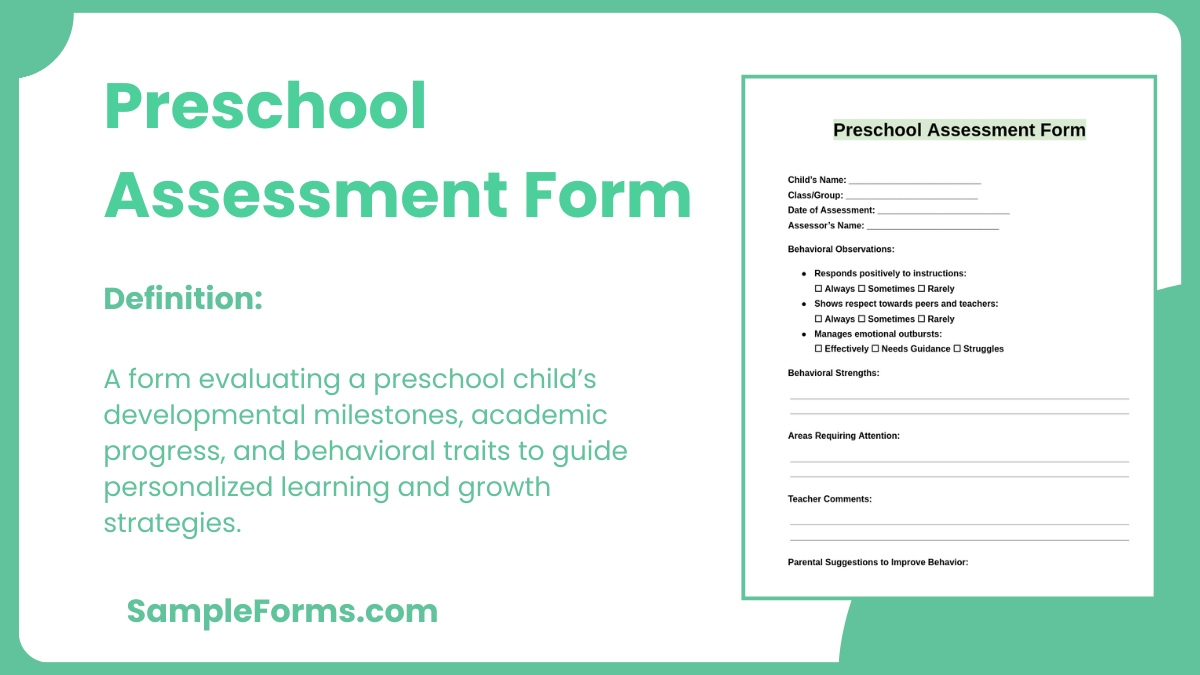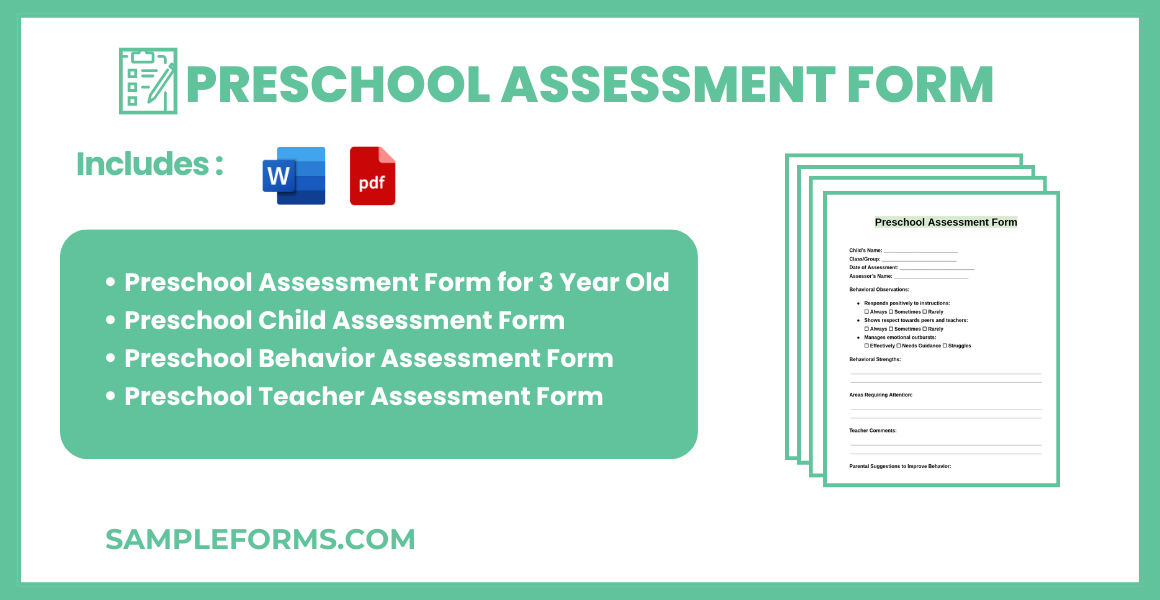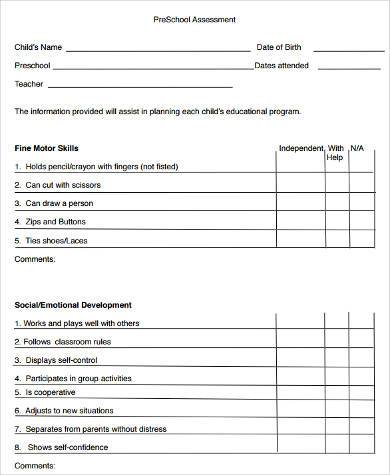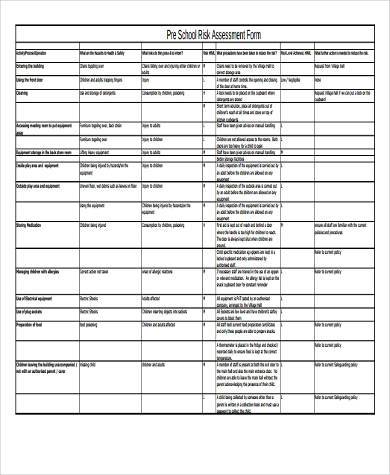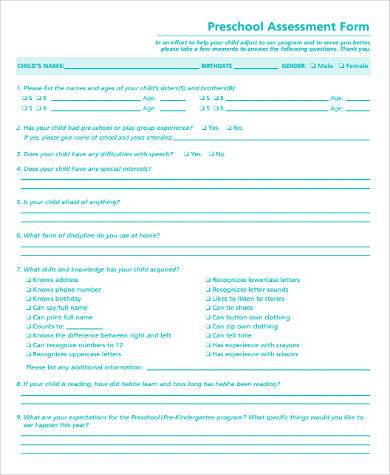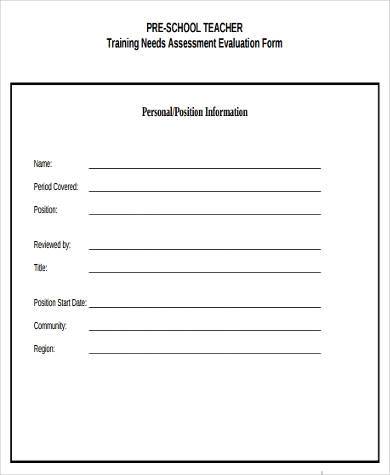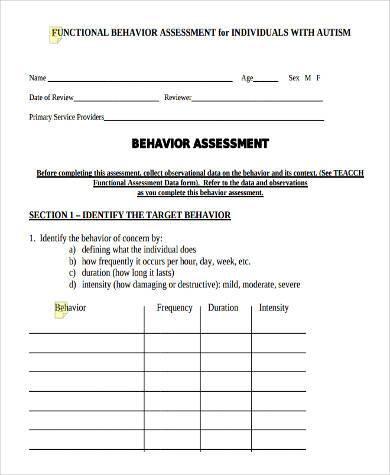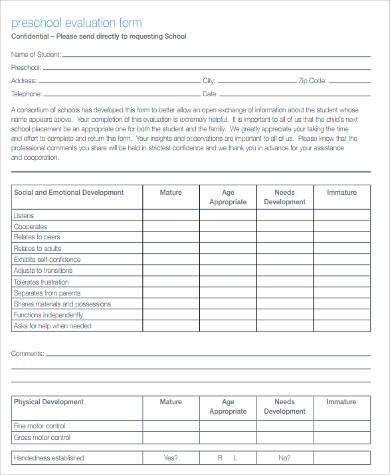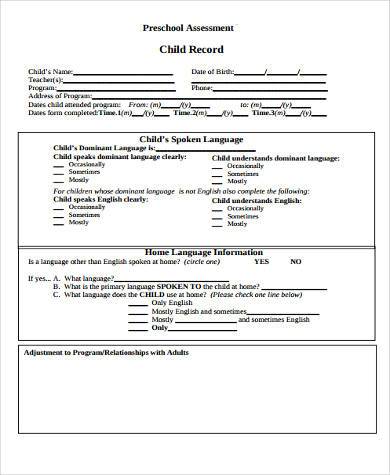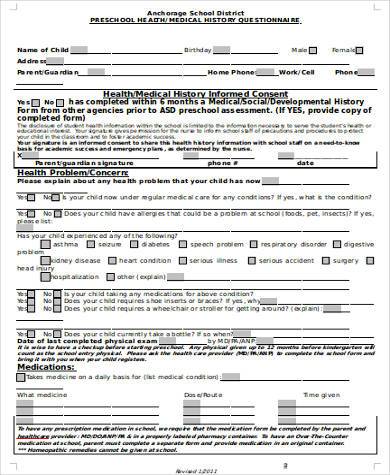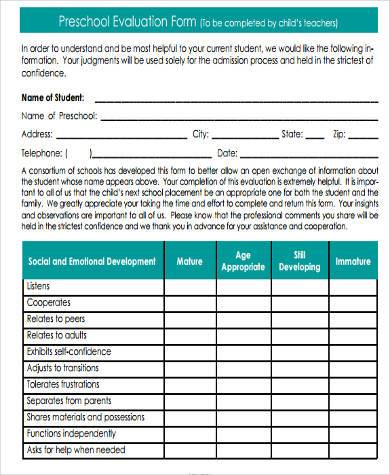A Preschool Assessment Form is a vital tool for tracking a child’s developmental progress in early education. It assesses various areas such as cognitive, social, emotional, and motor skills. This guide offers examples and insights on how to craft an effective Assessment Form for your preschool. Learn how to include essential sections like teacher observations, parent feedback, and targeted milestones. Paired with a School Form, these tools enable educators and parents to collaborate in understanding and fostering a child’s growth. Discover tips for creating forms that are clear, actionable, and aligned with developmental goals.
Download Preschool Assessment Form Bundle
What is Preschool Assessment Form?
A Preschool Assessment Form is a structured document designed to evaluate a child’s learning, behavior, and development in early education settings. It captures observations on skills like communication, problem-solving, and motor abilities. These forms help teachers and parents understand a child’s strengths and areas for improvement, promoting effective learning strategies. Used alongside tools provide a comprehensive view of progress, ensuring each child’s unique needs are met. These forms are essential for guiding preschool curricula and fostering a nurturing learning environment.
Preschool Assessment Format
Child’s Name:
- [Full Name]
Date of Assessment:
- [Date]
Class/Grade Level:
- [Preschool Class or Grade Level]
Teacher/Assessor:
- [Name of the Teacher or Assessor]
Developmental Milestones:
- [List skills assessed, such as motor skills, language, social interaction, and cognitive abilities.]
Academic Progress:
- [Describe progress in early literacy, numeracy, and creative activities.]
Behavioral Observations:
- [Note observations about the child’s interactions, behavior, and adaptability.]
Strengths:
- [Highlight areas where the child excels.]
Growth Areas:
- [Suggest areas for improvement or additional support.]
Recommendations:
- [Guidance for parents, additional resources, or support services if needed.]
Parent/Guardian Signature:
- [Signature and Date]
Preschool Assessment Form for 3 Year Old
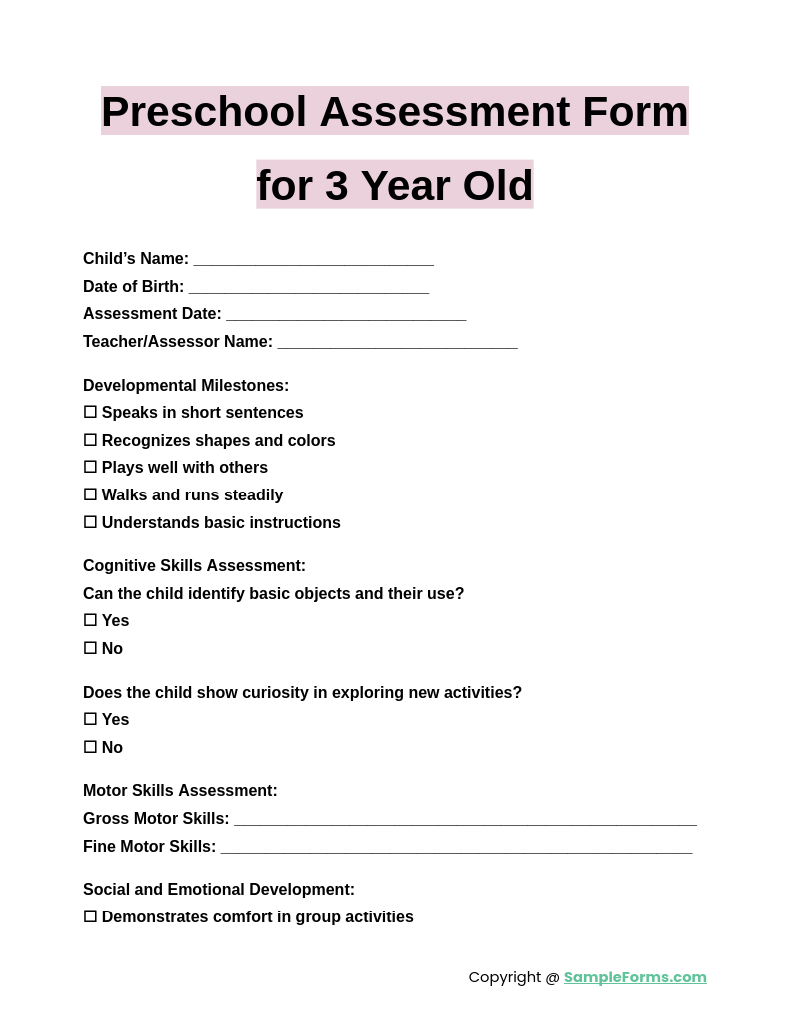
A Preschool Assessment Form for 3 Year Old evaluates developmental milestones, focusing on cognitive, social, and motor skills. It complements tools like a Family Assessment Form to better understand individual growth in a supportive context.
Preschool Child Assessment Form
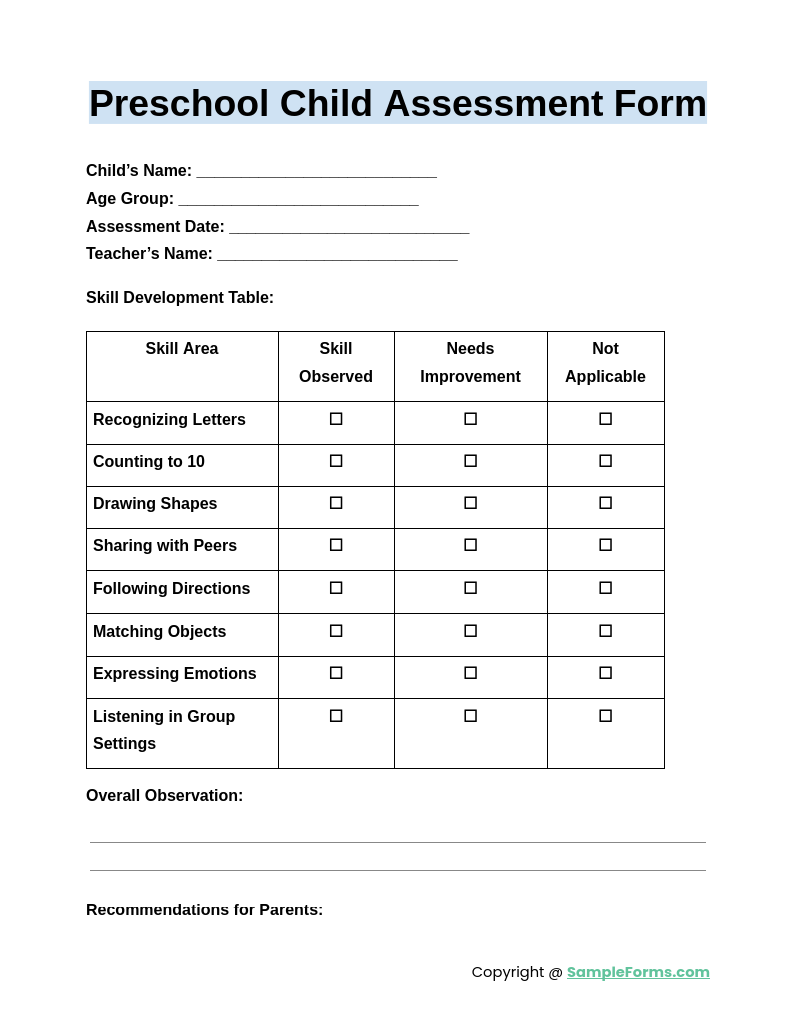
A Preschool Child Assessment Form tracks a child’s academic and personal progress. Similar to a Community Assessment Form, it involves collaboration between educators and parents to create a nurturing environment for growth and development.
Preschool Behavior Assessment Form
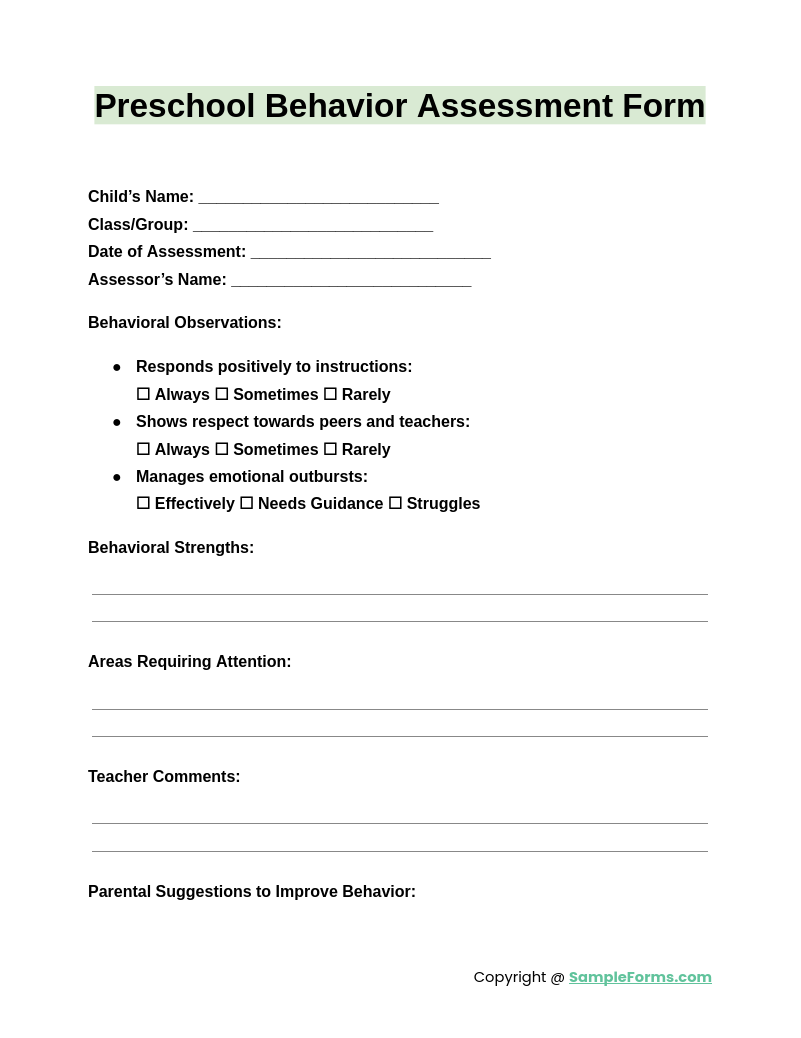
The Preschool Behavior Assessment Form examines social interactions and emotional responses. It uses frameworks akin to an Army Risk Assessment Form to identify potential challenges and implement strategies for behavior improvement effectively.
Preschool Teacher Assessment Form
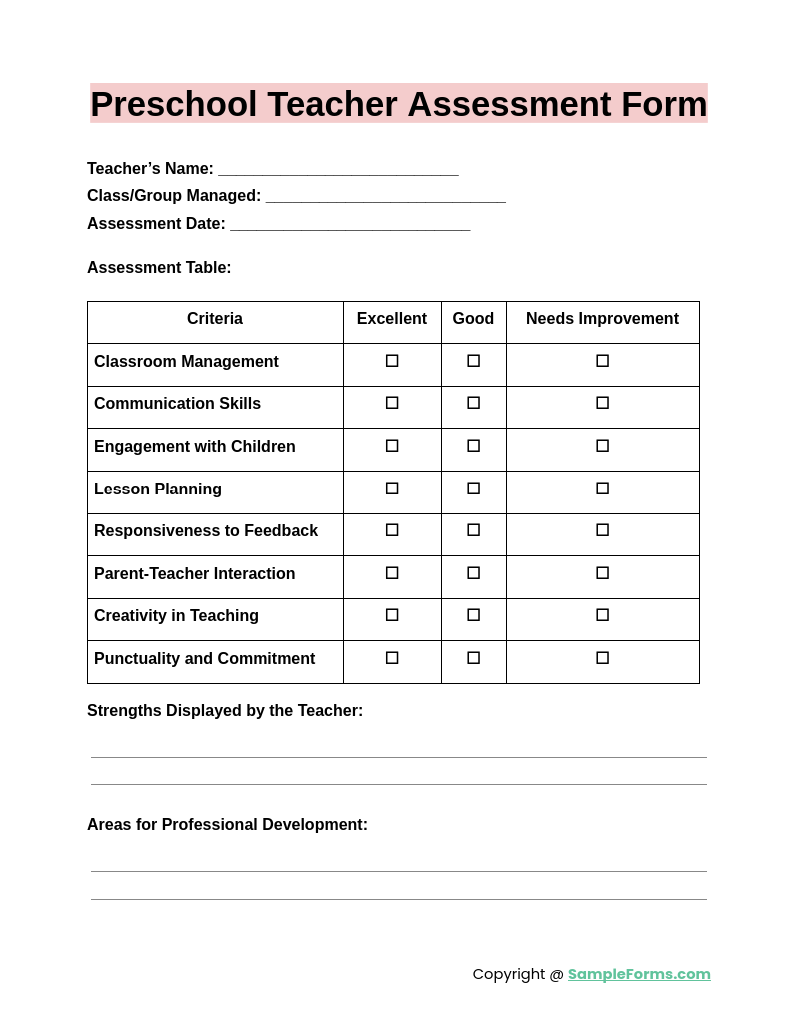
A Preschool Teacher Assessment Form evaluates teaching effectiveness and engagement strategies. It aligns with tools like a Student Self Assessment Form, encouraging reflective practices to enhance teaching quality and student outcomes.
Browse More Preschool Assessment Forms
Free Preschool Assessment Form
Preschool Risk Assessment Form
Preschool Assessment Form in PDF
Preschool Teacher Assessment Evaluation Form
Behavior Assessment Form For Individuals
Preschool Evaluation Form
Preschool Assessment Child Record Form
Preschool Health History Form in Word Format
Sample Preschool Evaluation Form
What to expect from preschool screening?
Preschool screening evaluates a child’s developmental readiness for structured learning, identifying strengths and areas for support. Key components include:
- Developmental Milestones: Focus on physical, social, and cognitive abilities using tools like a Pre Training Assessment Form.
- Language Skills: Assess vocabulary, sentence formation, and comprehension to understand communication readiness.
- Motor Skills: Evaluate fine and gross motor skills to identify coordination or mobility challenges.
- Behavioral Observations: Screen emotional responses and social interactions for adaptive readiness.
- Health Check-Up: Ensure vision, hearing, and overall wellness are aligned with preschool requirements.
What is the preschool evaluation scale?
The preschool evaluation scale is a standardized tool for assessing a child’s developmental areas, ensuring readiness for early education. It includes:
- Cognitive Development: Measures problem-solving and reasoning skills, similar to a Child Assessment Form.
- Social Skills: Assesses the ability to interact positively with peers and teachers.
- Emotional Growth: Evaluates self-regulation and adaptability in a group setting.
- Language Proficiency: Tracks understanding, speaking, and listening skills crucial for classroom communication.
- Motor Skills: Reviews fine and gross motor abilities for age-appropriate tasks.
How to do an assessment on a preschooler?
Assessing a preschooler involves structured observations and activities tailored to their developmental stage. Key steps include:
- Create a Comfortable Environment: Minimize stress during the process, using engaging tools like a Hazard Assessment Form to ensure safety.
- Observe Play Behavior: Analyze problem-solving, creativity, and social interaction during play.
- Conduct Structured Activities: Use games and tasks to evaluate cognitive and motor skills.
- Record Observations: Document findings for comparison against developmental benchmarks.
- Provide Feedback: Share results with parents, offering actionable suggestions for growth.
What does a child need to know before entering preschool?
Before preschool, a child should possess basic skills for successful adaptation to a structured learning environment. Key readiness areas include:
- Self-Care Skills: Ability to handle tasks like eating and toileting, similar to a Fall Risk Assessment Form focus on independence.
- Language Basics: Understanding simple instructions and expressing needs clearly.
- Social Interaction: Sharing, taking turns, and engaging with peers.
- Basic Motor Skills: Performing tasks like holding a pencil or stacking blocks.
- Emotional Regulation: Managing separation from parents and adapting to new routines. You may see our Preschool Observation Form
What are preschool assessment activities?
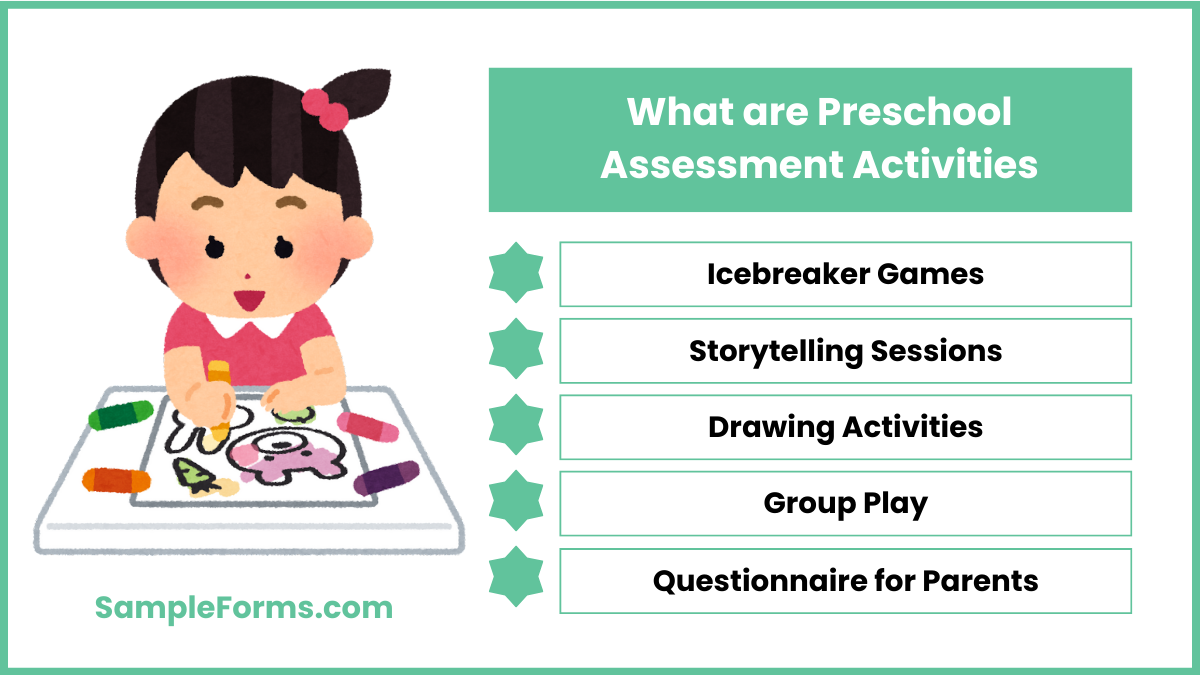
Pre-assessment activities prepare children for evaluations, ensuring accurate insights into their developmental stage. Effective strategies include:
- Icebreaker Games: Help build comfort and rapport, similar to a Driver Assessment Form easing participants into the process.
- Storytelling Sessions: Encourage language and comprehension skills through engaging narratives.
- Drawing Activities: Assess fine motor skills and creativity in a relaxed setting.
- Group Play: Observe teamwork and social interaction dynamics.
- Questionnaire for Parents: Gather insights about the child’s routine and preferences, akin to a Capacity Assessment Form.
What is the most used assessment technique used in early childhood?
Observational techniques are most used in early childhood, as they provide natural insights into development, similar to a Medical Assessment Form structure.
What are some common problems in assessments in early childhood?
Common problems include biases, lack of standardization, and inconsistent data, akin to challenges in completing a Self Assessment Form.
What are informal assessments for preschoolers?
Informal assessments involve play-based observations, artwork, and storytelling, resembling the interactive feedback approach of a Peer Assessment Form.
Can homework be a formal assessment?
Yes, homework can serve as a formal assessment if structured with clear goals, similar to documentation in an Initial Assessment Form.
What is formative assessment in preschool?
Formative assessment monitors ongoing progress through activities and observations, much like a Fire Risk Assessment Form evaluates safety conditions continuously.
What happens in a preschool assessment?
Preschool assessments evaluate cognitive, motor, and social skills using structured tools, often aligning with a Security Risk Assessment Form methodology.
What questions to ask at preschool orientation?
Questions include inquiries about daily schedules, teaching methods, and student-teacher ratios, akin to details provided in a Student Assessment Form.
What is the first thing to teach a preschooler?
Teach basic social skills, such as sharing and listening, as foundational tools for development, similar to an Employee Assessment Form emphasis on collaboration.
What should kids know by the end of preschool?
Kids should recognize letters, count to 20, and follow simple instructions, aligning with goals in a Skills Assessment Form.
How do you assess a preschool child?
Assessment involves observing behavior, motor skills, and social interactions using structured approaches like a Teacher Assessment Form for detailed insights.
A Preschool Assessment Form is key for evaluating and nurturing early childhood development. Paired with examples like the Job Assessment Form, it helps educators and parents track milestones and address learning gaps effectively. These forms are essential for ensuring a well-rounded approach to preschool education, fostering a collaborative relationship between teachers and parents. By using structured and actionable assessment tools, you can create an environment that supports growth, creativity, and foundational learning, setting the stage for lifelong success in education.
Related Posts
-
5 Assessment Methods That Promote Content Retention
-
Enquiry Form
-
FREE 5+ Recruiter Performance Review Forms in PDF | MS Word
-
Job Safety Observation Form
-
FREE 4+ Hazard Observation Forms in PDF
-
FREE 5+ Coach Observation Forms in PDF | MS Word
-
FREE 4+ Child Care Observation Forms in MS Word | PDF
-
FREE 4+ Child Observation Forms in PDF | MS Word
-
Student Observation Form
-
Peer Observation Form
-
Lesson Observation Form
-
Content Retention Through Assessment Form [ How to, Importance, Tips ]
-
Assessment Form
-
The Importance of Risk Assessment and Safety Statement [ What Is, How to Conduct ]
-
Risk Assessments And Safety Statements Guidelines [ What Is, Process ]
